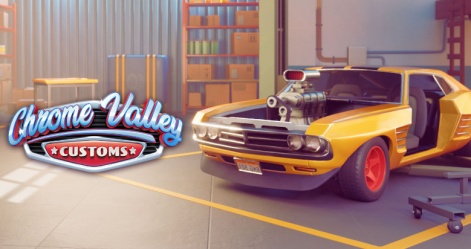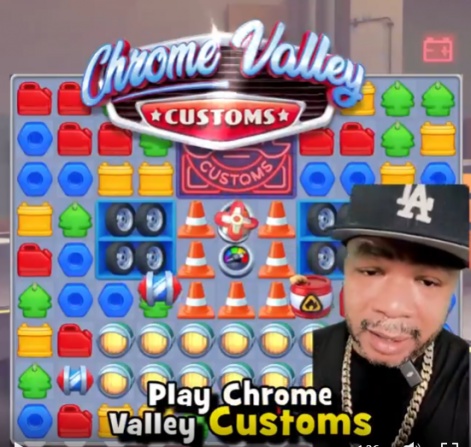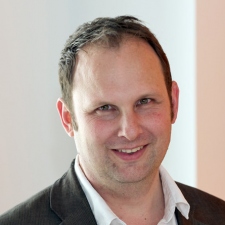Space Ape Games was founded in 2012 and released the popular music-based mobile hit Beatstar. Now, building on that title's success, Space Ape's more recent game, Chrome Valley Customs, has already surpassed over 12 million downloads and is on track to overtake Beatstar in lifetime revenue.
We spoke with Space Ape’s Co-Founder, Simon Hade, to discuss the long journey the studio has been on, their partnership with Supercell and negotiating an ever-changing market. We also discuss the future of Beatstar, the secret of Chrome Valley Customs' success and what to expect next from the team.
PocketGamer.biz: Space Ape Games has been developing games since 2012. How's the journey been so far?
Simon Hade: Eleven years is a long time to stick at something! So let's do some stats to put things in context.
- Seven games globally launched
- 24 games killed
- 170m+ people have played our games
- Nearly half a billion in revenue
- 3x Editor's Choice Games
- 2x Google Play User's Choice Awards
- 1x Mobile Games Award Game of the Year (Beatstar 2022)
- 1x Pocket Gamer Mobile Developer of the Year (2023)
But actually, in that time, we've really been four very different companies.
The execution era: At first, we aggressively chased Supercell’s Clash of Clans with very derivative games. Our breakout success came in Samurai Siege, a version of Clash that was hyper-targeted to the top 1% of players. We were laser-focused on that high-value player community and innovated in live ops and community events in a way that is table stakes and commoditised today but was super innovative and technically very complicated at the time. We then ran that playbook two more times and eventually found our first enduring hit in Transformers Earth Wars, which is still growing to this day and has grossed over $150m.
Beatstar put us back on the map and validated that we could take on complex challenges.Simon Hade
The innovation era: We then joined up with Supercell in 2017 by way of majority acquisition, and that heralded the start of a kind of “creative free for all” slate strategy. Our shared mission when joining them was to break into new genres. We had the ambition to make a game that everyone in the world played, and we realised that would not be possible in the strategy genre that we had cut our teeth on. Branching out into new genres was super risky, and we ended up killing 24 games in the following years, spanning 11+ genres. It was chaotic, but we developed a new set of muscles in evaluating opportunities, iterating and empowering talented small teams to do creative development, in contrast to the very top-down execution focus of the previous five years.
Music time: From that period, we got our first big hit: the rhythm music game Beatstar. Beatstar put us back on the map and validated that we could take on complex challenges. Beatstar innovated in gameplay and business model, partnering with the music industry in a way that hadn’t been done since the advent of free-to-play, and in distribution with a groundbreaking partnership with Supercell as the first game outside their core stable to integrate with their identity systems. It was a real collaboration, and the game has gone on to be played by 65 million people, generated over $130 million, won countless awards and even spawned a spin-off Country Music version.
We had the most terrible 12 months of our company's history as we entered the start of the year, but it was followed by the best six months in the end!Simon Hade
Casual: The fourth and final generation of the company started six months ago with the release of Chrome Valley Customs. From a commercial point of view, it’s on track to become our biggest game within the year - it’s already generated $40m in revenue and is still growing. But it also signals a change in approach. In contrast to the less structured blue sky creative period that gave us Beatstar, with Chrome Valley, we took a rigorous and disciplined approach to identifying what game to make and how to go about executing it. Casual puzzle is a bloody red ocean but the biggest mobile category by a mile and the only one that is growing. It’s incredibly difficult to compete in, but there is precious little innovation. We found an edge that allowed us to break into an underserved segment of the casual games audience - millennial males - with an intelligent marketing angle - car restoration, which was a fun, creative task, but then we executed like a well-oiled machine deploying the biggest team and biggest launch investment we’ve ever made, and it’s paid off.
Can you tell us a little more about last year? How was 2023 for the team?
2023 was an absolute roller coaster. We had the most terrible 12 months of our company's history as we entered the start of the year, but it was followed by the best six months in the end!
In 2022, like much of the industry, we had to do a hard pivot in our business strategy. Up to that point, we had been focused on top-line revenue growth, and almost overnight, we had to switch to a bottom-line profit-focused strategy. We were fortunate in that the impact on us was much less than that of many companies who had to go through layoffs, as we have a strong safety net through our parent company, but it did trigger a material change in strategy.
We also had to kill a big project and change the way we were marketing our live games, it forced us to be very intentional about what we chose to work on next. That was the impetus for our focus on casual. It’s a deceptively difficult genre to break into, but if you know what you are doing, it can be quite predictable as there is a decade of prior experience to draw upon.
So we got profitable, focused, and fully transparent with the company. At the end of 2022, we had less than 6m runway, but through managing costs and marketing tactics - not through layoffs, thankfully! We were able to extend that to 18 months and build up a war chest to launch the new games.
Chrome Valley and Country Star launched within six weeks of each other. Both had the benefit of only a 3m soft launch - an extended soft launch was a luxury we couldn’t afford. And it worked. We went from feeling like we were finished to making nearly $100m last year, with a strong toe hold in a new category and our other games doing better than ever. It really felt like snatching victory from the jaws of defeat.
You mentioned how Space Ape has been able to adapt to market changes, but how do you feel about the mobile games industry as a whole right now?
The industry as a whole feels pretty grim. It’s devastating to see daily news of some redundancy or cancellation, and my heart goes out to those impacted.
We’re just focused on ourselves, to be honest. We’re not eyeing up any big platform shift, holding our breath for changes in the payments landscape, or looking at AI games. We’ve had this success with Chrome Valley, which has created a toehold in the casual puzzle genre that we feel we can compete in, and so we’re just focused on building on that.
We've been growing the team from 50 at launch to 75 now, and it’ll get to 90 soon.Simon Hade
Are there any market trends that you are seeing or avenues to focus on for success?
One industry trend we are falling in line with is the focus on live games. When we joined Supercell in 2017, it was about freeing us up to focus on new game development. Everything we did was geared towards identifying new categories or new games. In retrospect, we should have focused a bit more on growing our existing games and communities.
Fast forward seven years, and that is where most of the value will come in mobile - from these big franchises or big games, evolving and serving their community and expanding their brands. Our version of that has been to ensure that we continue investing in our Transformers and music games as we have a strong, loyal, passionate group of players who just want more of what the game offers.
The other implication is that we are aggressively scaling up Chrome Valley. Whereas in the past, after six months of pushing, we would have been tempted to start rolling people off onto the next thing. We've been growing the team from 50 at launch to 75 now, and it’ll get to 90 soon. The team is focused on adding all kinds of new experiences and evolving the game to ensure it is something that people will keep coming back to for years.
What can you tell us about Chrome Valley's development process and how it's found success
I mentioned the four phases that we’ve been through earlier - we started as a hardcore execution shop, then pivoted to a creative innovation strategy before settling on a nice halfway house for Chrome Valley which solved some meaty creative challenges in the branding and positioning. But there was also an execution machine where we scaled to a rather large team, invested heavily in tooling and adopted new development processes.
A lot of the smartest decisions made during Chrome Valley’s development can be traced back to battle scars from as far back as 2017. The philosophy behind the tooling allowed us to compete with a team of a few dozen on our first puzzle game and produce content faster than some 300+ teams who’ve been doing it for a decade. There is a straight line to that from the tech that allowed us to compete for the most valuable players of Clash of Clans in 2013. That institutional knowledge is so important.

We could only do that because we were able to build on the learnings from the previous phases of the company. And we were only able to do that because so many Space Apes put their trust in us and stuck through thick and thin. We’ll have nearly 20 people celebrate their 10th anniversary at Space Ape this year and dozens have passed the five year mark. If we’d not managed to create an environment where people wanted to stick around this long we’d have lost a lot of the learnings. The biggest key to success, I think, has been to maintain a culture for all this to happen organically.
People who have worked together for years have leaner management structures and processes, and that can be a real barrier to bringing in juniors and specialists.Simon Hade
The other side to that, however, was that we were able to scale the team to bring in fresh new talent and perspectives. Sometimes cultures where there are a lot of people who have been around for years can be very high performing, but also very insular. People who have worked together for years have leaner management structures and processes, and that can be a real barrier to bringing in juniors and specialists. If we’d not been able to scale the team we’d not have been able to ship the game.
We hired over 40 people last year, after being around 100-120 people for the prior seven years. That took a big adjustment in how we onboard and who we look for. Prior to last year our average experience for new joiners was 10+ years, and usually that was entirely in mobile or free to play - so we’re talking about a small pool of super seasoned veterans. Of the 40 people we hired last year the average age is mid 20’s, there is a huge variety of backgrounds and experiences and it feels like a massive level up in every dimension.
Let's talk about the Chrome Valley Customs campaign featuring Xzibit. We're seeing a lot of celebrities getting involved with mobile game advertisements, and the former host of Pimp My Ride seems like a perfect fit.
We had used Alvin Joiner - Xzibit - in some small UGC content early in the game launch, and it blew up. The ad was just him recording himself talking about Chrome Valley into his iPhone, but there was something authentic in his reaction to the game, and obviously, when you put the game in front of anyone who grew up 2000's, the first thing they think of is Pimp My Ride and Xzibit. So it was a natural fit.
We then got talking and started kicking about ideas for a deeper partnership, and he flew out to spend a few days with the team here in London, and they really hit it off. We shot a few trial ads to explore different concepts and have been running them and getting excellent feedback from players and lots of people in the mobile marketing ecosystem. The partnership is still only in its early days as we're exploring where he best fits in with the world the team has built. We've got a bunch of activations lined up, though, so stay tuned.

I also just want to touch on Space Ape's other very well known game Beatstar! We have previously spoken about the spin-off title Country Star. How are things going with that and can we expect more genre specific spin offs?
Country Star was a really obvious opportunity because the genre is so clearly demarcated. We tried running a country music month in Beatstar and it was polarising and it was obvious that it needed its own app! Whilst there are a big number of country fans in Beatstar, the music did not sit well with the brand.
There are other audiences and genres we’ve thought about spinning off, but right now we’re just focussed on growing the two existing games and evolving Beatstar. I’d not rule it out for the future but doing more spin offs is not a current priority.
We just kicked off a new game and it’s really exciting because it is maybe the most seasoned team of any new game in Space Ape history.Simon Hade
And finally, can you tell us anything about what we can expect to see from Space Ape Games in 2024?
We just kicked off a new game and it’s really exciting because it is maybe the most seasoned team of any new game in Space Ape history. It has some of the key people from each of our three most recent global launches as well as a few new people, and they’ve just finished a several month long process of figuring out what game they want to make.
We run a model similar to Supercell where we like to give team’s a lot of autonomy not only to decide how to work, but also what to work on. In this case the team decided to build on our strengths as a studio. They had experience in both music and puzzle, and with such a huge investment going into Chrome Valley this year they decided that they will stick within the casual puzzle category and leverage a lot of learnings, tools and tech that we have there.
The game will look nothing like Chrome Valley to be clear - but the approach will be similar: to carve off another similarly underserved niche within the biggest, growing category on mobile, and find a fresh take to serve them. But it will be a casual puzzle game.





















